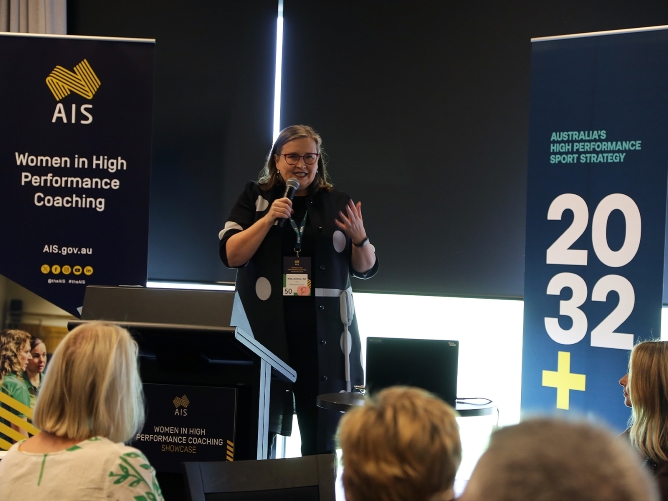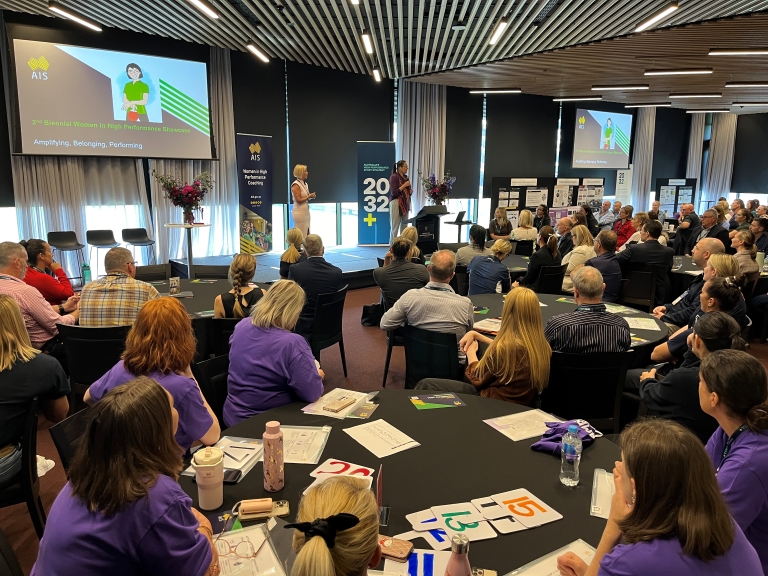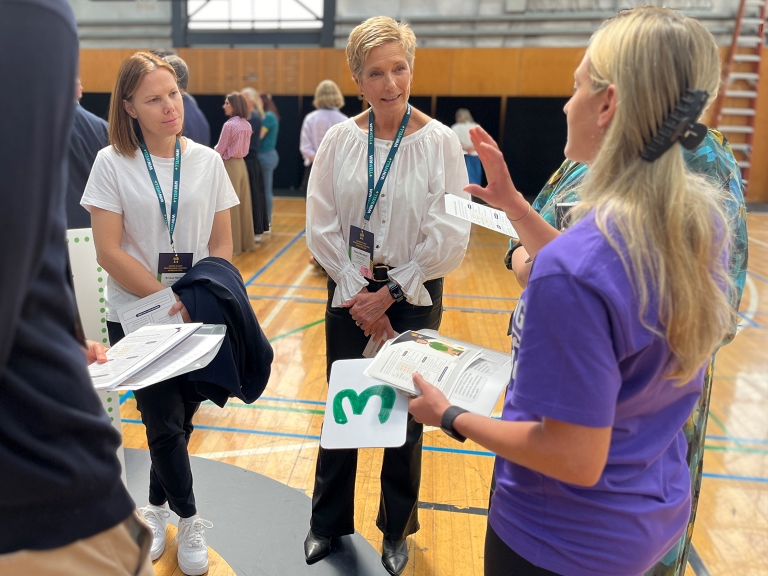13 November 2024
Australian sport is on the cusp of great change. It was made evident when leaders from 38 sports met in Melbourne this week to plan a better future for women coaches. A future that starts now.

Australian Sports Commission (ASC) Chair Kate Jenkins AO called for action at the AIS Women in High Performance Coaching (WiHPC) Showcase.
Below is the address she gave earlier this week.
“It is a great pleasure to see such a powerful and engaged group here to celebrate the progress of women in high performance coaching in Australia, share your expertise and to focus on what needs to happen next.
“I believe we are at a turning point.
“My goal for today is that everyone here looks back on this date as when Australia’s efforts to advance gender equality in sport really accelerated.
“In particular I would like to talk to you about the often-used mantra that “change takes time”.
“Over my life and especially in my previous role as Australian Sex Discrimination Commissioner I was regularly entreated to be more patient for change because “change takes time”.
“I thought it is worth sharing with you today how much time has already been expended towards improving opportunities for women in sport.
“My lifetime traces the evolution of second wave feminism in Australia. It also traces the story of the Australian Sports Commission.
“Second wave feminism first arrived in Australia from the US in 1969, first manifesting as consciousness raising, educating women on their rights and opportunities through women’s liberation.
“This quickly moved to advocacy for structural change in Australia, which resulted in reforms in education, childcare, equal pay and domestic violence services.
“While I was conscious of inequality facing women in work in the 70s, it seemed to me sport was a place for women and girls.
“I had numerous female athletes role models: Shane Gould, Evonne Goolagong Cawley, Tracey Wickham, Raelene Boyle. And both boys and girls had opportunities to participate in sport: I loved swimming, calisthenics, basketball, gymnastics, tennis and netball.
“In the early 80s, Australia witnessed significant reforms in sport, and for women. Rather than happening in parallel, these reforms went hand in hand.
“In 1981 Australia signed up to the United Nations’ Convention on the Elimination of all Forms of Discrimination Against Women (CEDAW), which included the requirement to take all appropriate measures to eliminate discrimination against women to ensure, on a basis of equality of men and women, the same right to participate in recreational activities and sports.
“Also in 1981, Australia established the Australian Institute of Sport, with 44% of scholarship holders being women athletes and women as head coach of two of the eight founding sports.

“In June 1984 the Australian Government convened the working group on women in sport.
“In August 1984, the Sex Discrimination Act passed, including laws prohibiting discrimination on the basis of sex in sport, and in September 1984 Prime Minister Bob Hawke announced the 20 founding members of the Australian Sports Commission, including five exceptionally well-qualified women.
“The Women’s Sport unit within the ASC was created in 1988, with its objectives including “to increase the quality and opportunities for women and girls to participate in sport as players, coaches, administrators and/or referees in a fair and unbiased environment” - objectives not dissimilar to those still pursued by the Commission today.
“Jump forward to today. Paris has celebrated the 2024 Olympics as the first gender equal games - a long way from the 1900 Paris Games where only 2.2% competitors were women.
“Australia first sent a gender balanced team to the Olympics to Rio in 2016, and our women have had more success than men in their medal tally since as far back as Beijing in 2008.
“This does not mean the women are better than the men – noting they do not compete against each other. But it does mean that Australia has had great success in supporting and developing women Olympians and Paralympians.
“We’ve also taken great strides in women sport administrators, with more to come under the recently released National Gender Equity In Sports Governance Policy.
“I attended Paris with an impressive array of women in influential roles for sport: The Minister for Sport Hon. Anika Wells, Chef de Mission for our Olympic team Anna Meares, Chef de Mission for our Paralympic Team Kate McLoughlin, Chair of Paralympics Australia, Alison Creagh, the first female Director of the Australian Institute of Sport, Matti Clements, and Australia’s Governor General and Paralympics Australia Patron, Her Excellency Samantha Mostyn.
“Against this progress we come to today’s topic: women in high performance coaching.
“The statistics are less heartening but do show progress. In Rio 9% of our HP coaches were women, 15.3 % in Tokyo and 18.6 % in Paris.
“With the work of the ASC team supported by the Australian sport sector, we now have insights and evidence on the barriers and actions to reverse the leaky pipeline of women out of HP coaching.
“Change is not inevitable. If change takes time, we’ve given it 40 years. But change does not happen of its own accord.
“Change takes leadership, commitment and action. I’m optimistic with the people and expertise in this room, we are now in a very good position to drive change. Let’s be the ones after 40 years of work to make gender equality in sport a reality,” said Jenkins.

The WiHPC Showcase aimed to put some harrowing statistics in the spotlight and present sports with strategies to help drive systemic change.
AIS HP Coach Development Senior Leader Michelle De Highden said: “We want sports to be deliberate and intentional in building environments where everybody belongs.
“This is much bigger than women in high performance coaching, it transcends high performance sport. We know that if we can amplify work and the voices of the women coaches and build belonging then we will optimise performance in the best way possible,” said De Highden.
All of this work underpins Australia’s pursuit of building a more sustainable sporting system as outlined in the High Performance Sport Strategy: Win Well